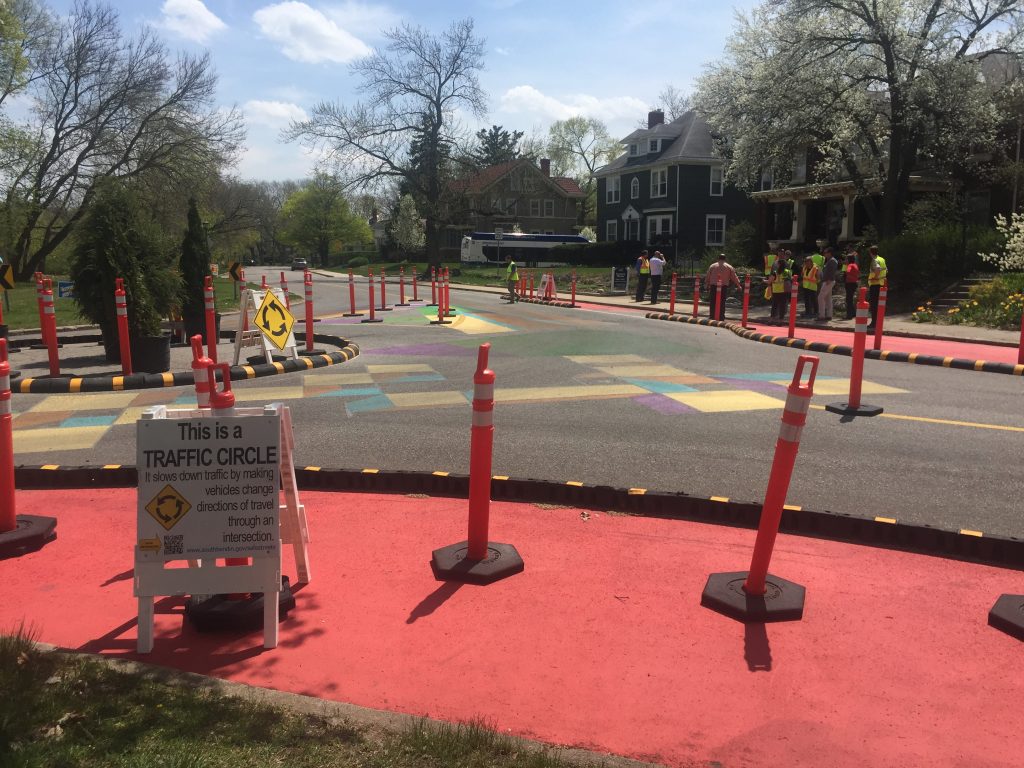
News
By Smart Growth America, May 29, 2018

Through our Safe Streets Academy, teams from Orlando, FL, Lexington, KY, and South Bend, IN launched demonstration projects to transform their streets into safer places for people walking, biking, and driving. How did they do it? On June 12, we're releasing new case studies to tell these stories — stories that can help others around the country learn how to create safer streets in their own communities. Join us for a webinar on June 12 from 2:30-3:30 p.m. ET to celebrate these projects and learn more about the cities' experiences.
With just a small amount of money and a bottom-up approach, leaders from each of these three cities came up with creative ways to engage their respective communities, produced fast and flexible solutions to slow traffic and create safer conditions for people walking or biking, and then measured the results and listened to community feedback to recalibrate the projects and further improve them.
Along the way, they built support both within their local communities and within their public agencies for making changes permanent—or for bringing similar transformations to other areas to make them safer.
During this webinar, a representative from each of the three cities will share how they worked closely with their communities to test different ways to design safer streets. They'll discuss how these projects evolved, how people responded, and the lessons they learned from these experiences. They'll also discuss the benefits of using demonstration projects, such as the opportunity to quickly and test out new low-cost ideas that might not otherwise have been possible and building better working relationships with business owners, elected officials, community members, and other jurisdictions. Speakers include:
- Billy Hattaway – Director of Transportation, City of Orlando, FL
- Scott Thompson – Senior Transportation Planner/Bike and Pedestrian Coordinator, Lexington-Fayette Urban County Government, KY
- Jitin Kain – Deputy Director of Public Works, City of South Bend, IN
We got a chance to visit South Bend's project in person earlier this month, and the photos really speak for themselves:
Officials from Lexington and Orlando learned about traffic safety designs this week by visiting South Bend's neighborhood traffic calming and Smart Streets projects. @LexingtonKyGov @citybeautiful @completestreets pic.twitter.com/dgpSaUve0h
— Smart Streets SB (@SmartStreetsSB) May 4, 2018
Temporary @CityofSouthBend traffic circle slows down cars, but don't worry - garbage trucks can still fit through! #SafeStreets #TacticalUrbanism #CreativePlacemaking pic.twitter.com/a4RYKrgdhI
— Complete Streets (@completestreets) May 2, 2018
We couldn't resist testing out one of @CityofSouthBend #SafeStreets traffic circles on @limebike #BikeMonth pic.twitter.com/ntRMbEtUAN
— Complete Streets (@completestreets) May 2, 2018
Checking out @CityofSouthBend temporary #chicane to calm traffic for #SafeStreets pic.twitter.com/LXU9brVY7K
— Complete Streets (@completestreets) May 2, 2018
We're so excited to share more information about these projects when we publish our case studies on June 12. Registration for the release webinar is now open. We hope to see you there!
The Safe Streets Academy is funded by Road to Zero, a coalition of almost 700 organizations committed to reducing traffic fatalities in the United States to zero over the next three decades. The coalition holds quarterly meetings to discuss innovative research and strategies and offers tools, resources, and grants to support safer streets nationwide.
Related News

© 2025 Smart Growth America. All rights reserved
Site By3Lane Marketing















